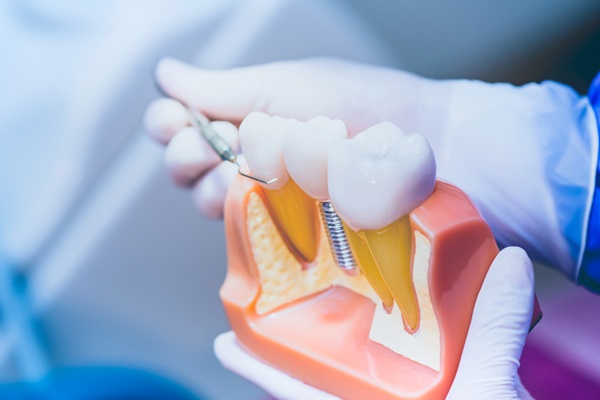4 Questions to Ask a Dentist About Implant Crowns
Posted on: August 13, 2024

An implant crown is an important part of dental implants. This is a cap that goes on the end of the implant, acting as the tooth. It is natural-looking in color, shape, and size. If you are missing a tooth, you should not have to live with a gap in your mouth. This treatment can be beneficial to your smile and your oral health. Before you go in for your treatment, be prepared to ask your dentist some important questions to help you feel more comfortable.
The benefits of implants
Losing a tooth can have some significant impacts on a person. This can be an embarrassing situation that may cause the person to want to avoid being around others. Tooth loss can also make it difficult to eat a healthy meal. It can also cause additional teeth to fall out and may result in bone loss. Implants can restore the full function of the mouth by improving the person’s chewing ability. Implants also improve the person’s smile and eliminate unwanted spaces.
What are they made of?
An implant crown is virtually identical in appearance to a real tooth. One of the reasons for this is due to the type of material the dentist will use. The crown is usually made of a tooth-colored material such as ceramic or porcelain. Some dentists may use porcelain fused to metal, which can be even more durable. Other possibilities are zirconia.
How long do they last?
One of the advantages of getting implants is that they will last longer than other tooth-replacement options. The post and abutment portion of the implants can last up to 20 years or more. The implant crown can last for up to 10 years before it needs to be replaced. The longevity will depend on how well the person takes care of it. Limiting hard and sticky foods will help it last longer.
Is it painful to get an implant crown?
The process of getting implants can involve some soreness after the procedure. It can also take a few weeks to get used to the implants. But getting the crown should not be painful. The dentist will attach the crown to the abutment using connectors. This may irritate the mouth at the spot where the implant was placed.
How long does it take?
Getting an implant crown is by far the fastest part of the implant process. The dentist placing the post into the jaw and then attaching the abutment to the post can both take an hour or longer. Once the patient has healed from these surgeries, the dentist can put on the crown. This should only take 15 minutes. It can take a little longer if the dentist needs to make any adjustments.
Revive your smile with implants
The dental implant crown completes the implant process. This crown will look just like your real teeth and should allow you to chew most foods that you enjoy. The more you understand about this procedure, the more at ease you will feel. You can also be certain that this is the treatment you need.
Are you considering getting an implant crown in the Vienna area? Get more information at https://justforyoursmile.com.
Check out what others are saying about our services on Yelp: Implant Crown in Vienna, VA.
Related Posts
A dental implant restoration can replace a missing tooth that falls out naturally, gets knocked out or is extracted. A dental implant restoration is often recommended after tooth extraction, as it prevents bone loss from occurring and offers cosmetic and functional benefits. There are several ways to replace a missing tooth after an extraction, including with…
Just For Your Smile Dental Clinic in Vienna, VA is looking for a Dentist to perform thefollowing job duties:Performing exams and evaluating x-rays to determine a patient’s health and give patientsdifferent treatment options; Conduct comprehensive assessments of patients’ oral health,including the condition of teeth, gums, and jaw structures; Develop detailed treatment plans forrestoring oral function…
Dental cleaning is a huge part of routine check-ups. The procedure involves using a scaler to scrape off tartar and plaque deposits from the tooth surfaces. Plaque is the sticky film that builds up on teeth, and it hardens into tartar when left on the tooth surfaces for a few days. Both make you more…
Knowing when you need an emergency dentist can help save teeth, preserve oral health, and prevent serious complications. From sudden tooth pain to dental trauma, understanding the signs that require immediate attention helps ensure timely and effective care. Learning more about the role of an emergency dentist can prepare patients to act quickly in critical…





